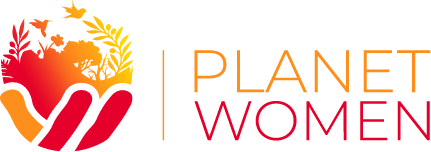Better Outcomes through Gender Mainstreaming
Did you know that every conservation field project carries within it an opportunity to increase gender equity—while benefiting nature?
Gender mainstreaming is a process and strategy that integrates the perspectives and needs of men and women in the design, implementation, and evaluation of policies and projects. It's extremely important for conservation practitioners to know and use.
Thanks to the support of the Planet Women community members like you, we've provided gender mainstreaming training to 115 women and men working on forest restoration across Africa, as of June 2024. Learn more in the video below! You can also listen to the Gender Mainstreaming course leaders discuss the program on the Environmental Voices Rising: Women at the Mic podcast with Michal Crawford-Zimring.
In this video, Gender Mainstreaming course leader Irene Ojuok gives an overview of what environmental leaders gain from the course.
Without gender mainstreaming, environmental projects can perpetuate and even worsen gender inequity. The Global Environment Facility sums this up well:
"Literature and studies on this topic recognize that failure to understand and address gender dimensions within environmental projects risks wasted development resources and negative effects on household welfare, women’s equality, and environmental sustainability. Moreover, various studies, including an evaluation of gender conducted by the World Bank, find that project results are superior when gender considerations are integrated into the design and implementation of projects."
Make a gift that benefits nature AND improves gender equity
Planet Women has fully funded gender mainstreaming courses for 60 people so far. Your support is needed to sustain and grow this free-of-charge offering to grassroots organizations in Africa. Will you please make a donation today? Your donation ensures resources and support for gender champions who protect and restore nature. Thank you!
About Irene Ojuok: Irene Ojuok is a dedicated environmentalist with over a decade of experience working alongside rural communities in Kenya and other African countries. She possesses a Bachelor's degree in Environmental Studies and a Master's degree in Project Planning and Management and is currently pursuing her Doctorate at the Right Livelihood College (RLC) Campus, hosted at the Center for Development Research ZEF, University of Bonn, where her research focuses on Land Degradation and the impactful practice of Farmer Managed Natural Regeneration (FMNR) in Kenya. Irene is a proficient expert in several domains, including project design and implementation, capacity building, advocacy and policy influence, private sector partnerships, gender mainstreaming, research, and documentation. Her primary focus areas are sustainable land management practices, climate change initiatives, and community-driven development models with extensive experience in FMNR. Irene has earned several notable accolades in recognition of her unwavering commitment to transformative change. In 2020, she was named a Global Evergreening Ambassador and Tree Ambassador by Total Eco Challenge Kenya in 2016. Additionally, she is regarded as a Global FMNR champion supporting FMNR awareness and capacity building globally. Irene is passionate about community-led sustainable land restoration and livelihood strengthening. Her dedication to enhancing both lives and landscapes is unwavering. Contract Irene on LinkedIn.
